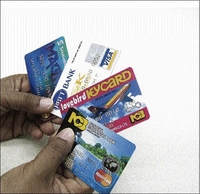Banks tighten credit card lending
Published: Sunday | November 15, 2009

To limit exposure to the bad-loan losses in the current economic climate, commercial banks reined in their credit-card lending, the result of which has been a major slowdown in the sector that limited growth to one-eighth the levels seen last year.
Credit-card receivables, the measure used to track the sector, inched up by less than three per cent in 2009, as banks retreated, even in the face of consumer demand to sell more credit.
"There is just as much demand for cards," Bruce Bowen, the chief executive officer of Scotia Group said. But: "We are putting out fewer cards," said the banker, whose institution has the largest portfolio of issued credit and is also No. 1 in deposits.
Bank of Jamaica statistics show that credit-card receivables for the financial sector at August 2009 stood at $17.3 billion, but that reflected only a $500 million or 2.9 per cent increase over the $16.8 billion of receivables outstanding at August 2008.
Indeed, at that date last year, receivables were up by $4 billion, or eight times the pace at which credit consumption increased this year.
The central bank data show that July and March were the months of lowest spending, whereas the peak was in August, possibly associated with back-to-school expenditure.
Credit-card subscriptions come at a heavy price, ranging from 29 per cent to 52 per cent, but mostly hovering in the mid-40 per cent range on JMD-denominated plastic. Those that are USD-denominated start at 17.5 per cent.
A Sunday Business survey among local banks identified 24 varieties of consumer credit cards, with limits as low as $5,000, and as high as $900,000 for Jamaican-currency-denominated cards.
Not only have the banks been less willing to issue new cards, they have also been turning down requests, say well-placed sources, to increase credit limits.
third-quarter financials
Elena Villafana-Sylvester, who had her last day on the job Friday as a former Scotiabank vice-president for electronic financial services and retail banking, said in an earlier interview that consumers remained interested in applying for and using credit cards, but declined to say how the bank had responded to these requests.
As reported in its third-quarter financials this year,
Bowen is playing down any attempts by his bank to put the squeeze on credit-card holders.
"We have not really tightened our policy, but we are making fewer exceptions," he said.
"Also, as income is reduced, fewer people will qualify."
An official at First Global Bank, who declined to be named, said this year, the bank approved fewer cards than in 2008.
New issues amounting to 774 cards were 514 fewer, or 40 per cent less than last year's 1,288.
Despite this, First Global said it saw increased spending of up to 25 per cent more in 2009 over 2008 on its Jamaican dollar credit cards, flowing from a 46 per cent increase in the number of transactions.
National Commercial Bank (NCB), which recently reported another year of bumper profits, a record $10.2 billion, has also admitted to tightening up on credit in general.
credit losses
For the financial year ended September 30, 2009, NCB's provision for credit losses totalled $1.028 billion compared with $468 million for the year-prior period ended September 30, 2008.
BNS says it will be more aggressive in its credit-card policies and marketing activities next year.
"In 2010, there will be a more aggressive approach, not to loosen policy, but to find those who can afford the product," said Bowen.
avia.collinder@gleanerjm.com
















